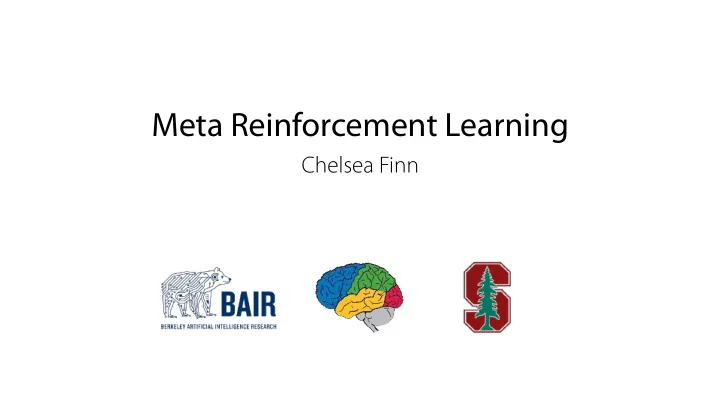

Meta Reinforcement Learning Chelsea Finn
Why are humans so good at RL? People have prior experience. People have an existing representation of the world. Can we learn a representation under which RL is fast? Key idea : Explicitly optimize for such a representation “Learn how to reinforcement learn”
Outline Meta-RL Problem Formulation & Examples Method Classes: Recurrent Models, Gradient-Based Models Challenges & Latest Developments
The Meta-Learning Problem Supervised Learning: Inputs: Outputs: Data: Meta Supervised Learning: Inputs: Outputs: Data: { Why is this view useful? Reduces the problem to the design & optimization of f . Finn & Levine. Meta-learning and Universality: Deep Representation… ICLR 2018
Example: Few-Shot Classification Given 1 example of 5 classes: Classify new examples test set training data meta-training training classes … … diagram adapted from Ravi & Larochelle ‘17
Meta-RL Example: Maze Navigation Given a small amount of experience Learn to solve the task By learning how to learn many other tasks: … diagram adapted from Duan et al. ‘17
The Meta Reinforcement Learning Problem Reinforcement Learning: Inputs: Outputs: Data: Meta Reinforcement Learning: Inputs: Outputs: Data: { dataset of datasets k rollouts from collected for each task *and* collecting appropriate data Design & optimization of f (learning to explore) Finn. Learning to Learn with Gradients. PhD Thesis 2018
Meta-RL Example: Maze Navigation Given a small amount of experience Learn to solve the task [meta] test time [meta] train time By learning how to learn many other tasks: meta-training … tasks diagram adapted from Duan et al. ‘17
The Meta Reinforcement Learning Problem Meta Reinforcement Learning: Inputs: Outputs: { Episodic Variant k rollouts from Inputs: Outputs: { Online Variant 1…k timesteps from
Outline Meta-RL Problem Formulation & Examples Method Classes: Recurrent Models, Gradient-Based Models Challenges & Latest Developments
Recommend
More recommend